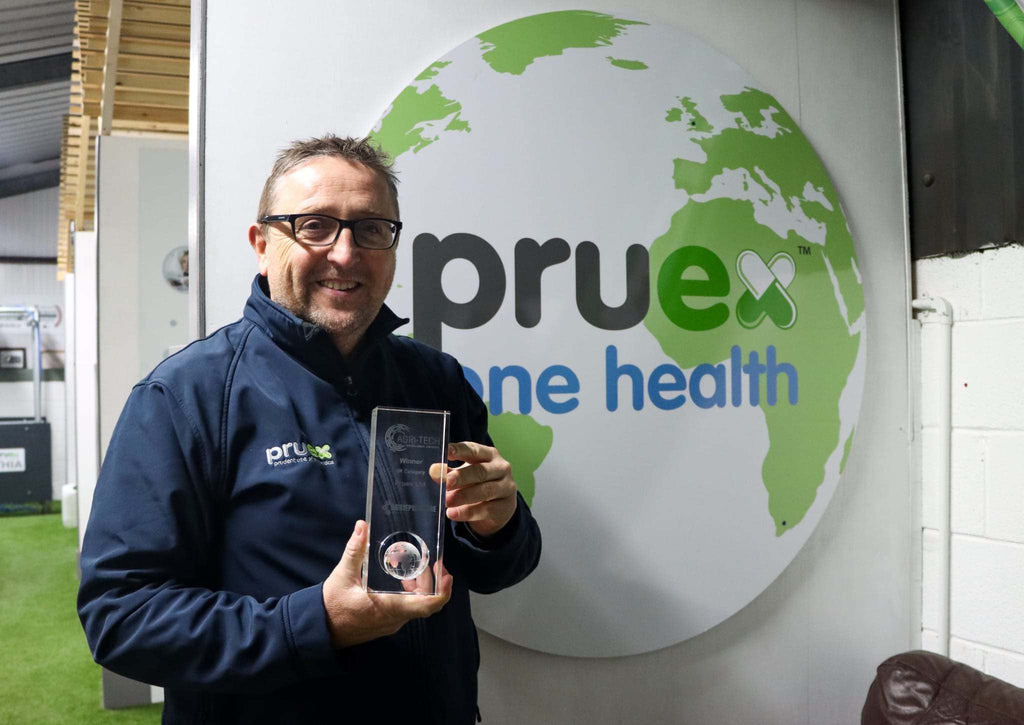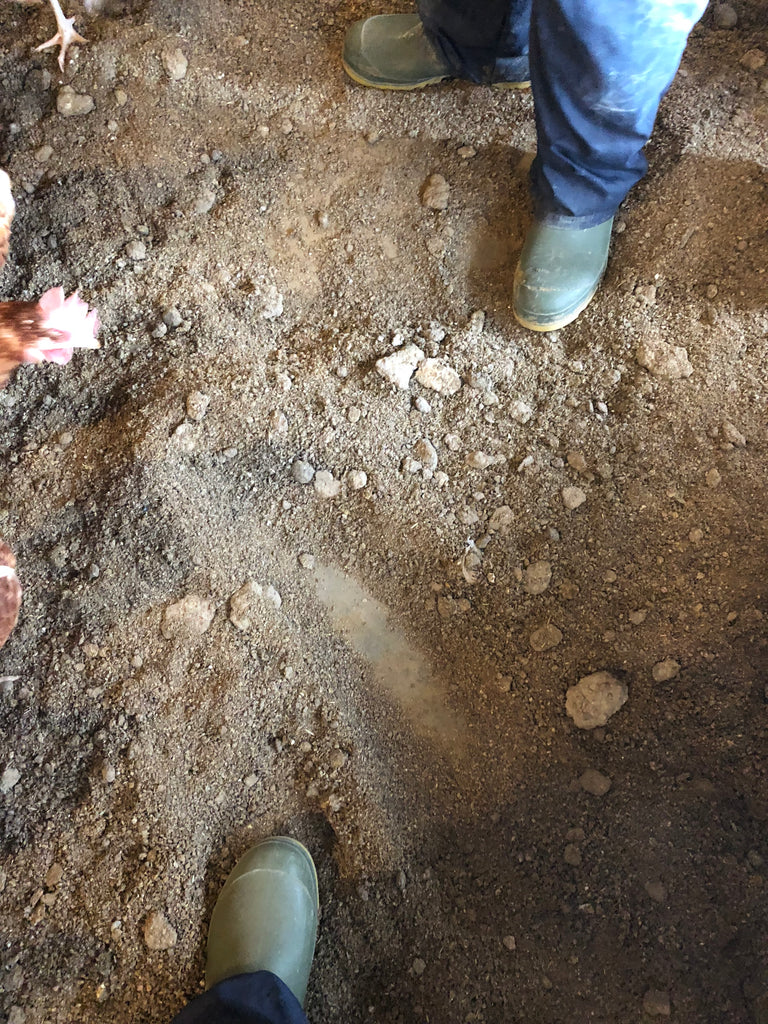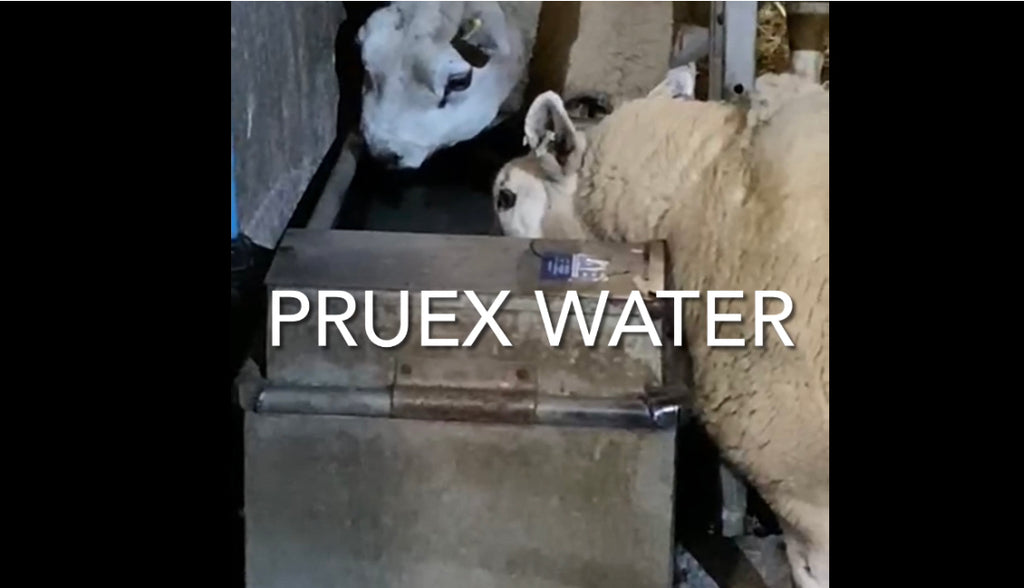News
Environment, Circular Economy, Sustainability and good farming practice.
Pruex work in the Uk, the EU and Africa helping farmers keep animals healthy and contribute beneficially to the environment. Healthy animals, lead to healthy muck and healthy soils. Healthy animals don't need antibiotics. Healthy aerobic muck and slurry ensure better air quality with reductions in volatilisation of ammonia and methane, and denitrification of toxic nitrous oxide. Healthy soil is also vital for healthy rivers and oceans, and is key in our strategy to capture carbon from the atmosphere.This strategy ensures healthy plants and soil biodiversity which are vital to the survival of small birds and mammals.
Pruex help farmers produce food and other products in both sustainable and environmentally beneficial ways, replacing heavy pollutive chemicals with natural bacteria which originate from soil and water. Pruex add more nature into the farms by means of substituting chemicals with biological products. Modern chemistry knowledge has resulted in our environment being bombarded by man made chemistry, but Pruex is changing this scenario. Pruex use bacterial detergents, products containing good bacteria that keep animal muck and soils aerobic, full of oxygen and life. This helps plants develop deep roots which improves the soil so that it can hold more water, nitrogen, phosphorus, carbon and oxygen. This prevents the soil from becoming too acidic and from releasing toxic nitrous oxide and ammonia. Reducing nitrogen and phosphorous leaching to the river is key to the health of all waterways. Sustainability and the circular economy were the norm for many of our grandparents in Europe. With technological advancement, and a drive towards a linear economy, we've unintentionally polluted our air, rivers, oceans and soils. Pruex is helping small, medium and large farmers to rebuild sustainable industries based on the circular economy.
Biology has the answer to our environmental pollution issues and oxygen is really important. We have to keep animal muck aerobic, soil aerobic, and our waterways aerobic if we want to ensure agriculture doesn't pollute the air, soil or water, and continues to thrive as an industry in an environmentally beneficial manner. Pruex has the expertise that enables farmers to achieve aerobic excellence in their guardianship of soil.
In 2015, Aled Rhys Davies, our founder, set out on a two year international travel scholarship awarded by the Nuffield Farming Scholarship Trust. He studied antibiotic use in agriculture in Europe, Oceana, and Northern America. He realised that the use of chemicals in agriculture led to sick animals, sick waterways and soils. He realised that the issues of algae blooms in rivers and oceans, greenhouse gas and ammonia release from muck, slurry and human sludge, and the high velocity of increase in antimicrobial resistance (AMR), were all linked. The answer to all of these issues relies on keeping animal (including human), muck, waterways and soils aerobic. He founded Pruex in 2016 with the aim of leading the fight against AMR and environmental pollution. Eight years later, Pruex has developed internationally with operations in the EU and Africa. If you would like to know more about the Nuffield Farming Scholarship Trust, which inspired Aled to take action and incorporate Pruex then visit https://www.nuffieldscholar.org/
AMR - don’t forget about fungi
Pruex utilizes beneficial bacteria to capture moisture from animal bedding and their surroundings, creating an environment where harmful microorganisms, including fungi, struggle to thrive.
Anger as bacteria found at river swimming site
Jack Grey of BBC news reports that:
Elevated levels of harmful bacteria have been found at Wales’ first official river bathing site, warn public health officials.
Wild swimmers have been advised to stay out of the River Wye at The Warren, a pebble beach near Hay-on-Wye, Powys, after high levels of E.coli and intestinal enterococci bacteria were found. These two bacteria are tested for because they are markers of the presence of sewage.
See Full article using this link https://www.bbc.co.uk/news/articles/c4ng45v5qx2o
Pruex can reduce environmental pollution from Human, Agricultural and Non Food animal sectors.

Why is the environmental impact of Pruex so important in the fight against AMR?
Resistant bacteria or antimicrobial resistance (AMR) from human sludge, slurry, muck, and landfill are polluting our waterways, contaminating our land, and infecting our wildlife. As resistant bacteria increasingly dominate wildlife and their environments, the rate at which they spread and become more prevalent accelerates.
The Guardian newspaper in the United Kingdom have just highlighted some research illustrating the scale of the current problem.
Pruex has the answer:

We can alter the bacterial composition of human sludge, slurry, and muck to contain non-infective types. Our work in agriculture, as well as in human and non-food animal markets, helps reduce pollution from gases and reactive mineral leaching into waterways. By shifting the bacterial makeup of faecal waste products from being dominated by pathogenic, pollutive, and resistant bacteria to non-infective strains, we can keep animals healthy, minimise pollution, and slow the progression of antimicrobial resistance (AMR).
Pruex aims to lead the fight against AMR and environmental pollution. Please help us.
A collaboration seen as a major step forward in the fight against Anti Microbial Resistance (AMR).
Background - Antibiotics are of utmost importance in the medical professions armoury against pathogenic infections, but each time they’re used in an attempt to kill infective bacteria we take a risk. Within a bacterial colony often there are ones that differ genetically from the rest. These carry resistant genes that prevent the antibiotics we use from killing them. If we kill the majority of susceptible bacteria but not the resistant ones, we make space for these resistant bacteria to become dominant. In other words, the antibiotic will no longer work against these resistant infective bacteria. This is also the case with disinfectant and antiseptic products. It seems, the more we clean with disinfectant, or the more we treat infections with antibiotics and antiseptic, the more dangerous the resistant bacteria can become. Bacteria build nests called biofilm on surfaces to protect themselves, for example, plaque on our teeth. When biofilms form, the efficacy of disinfectant, antiseptic and antibiotic technology reduces significantly. Biofilm dominated by resistant bacteria is disastrous. We face therefore, a return to a pre antibiotic era where child birth, simple cuts or grazes, or stomach upsets could become fatal. We have to protect the antibiotics we have, ensuring their efficacy for as long as possible. We have a fight on our hands against resistant bacteria. We have a fight against AMR.
A major breakthrough in this fight is being worked on via a collaboration between Pruex Ltd from Carmarthenshire in Wales and Biowet Drwalew from Warsaw in Poland. Pruex, an innovative one health company, use detergents containing non infective bacteria to compete against infective ones in the environment and consistently demonstrate modulation of biofilm from being dominated by potentially pathogenic colonies of bacteria to non infective types. Biowet Drwalew manufacture antibiotics and have a long history and an established position in the market of veterinary medicinal products in Poland. Both organisations objectives align as they both want antibiotics to keep working for as long as possible without the threat of increasing AMR.
It’s known that biofilm on surfaces can contain resistant bacteria that can infect animals including humans. Biowet Drwalew manufacture antibiotics to World Health Organisation standards. Pruex products will be used to ensure the animals have clean water, a dry bed and clean air to breathe. By doing so, the aim is for the contents of the biofilm in the animal housing and water lines to change, increasing the dominance of non-infective bacteria and reducing the numbers of resistant bacteria. Reducing the number of resistant bacteria present will safeguard the use of antibiotics for future generations.

This work was presented by Aled Rhys Davies of Pruex on the 19th April at the prestigious 18th scientific buiatrics conference, specific and non-specific immunoprophylaxis of selected cattle diseases - new achievements and directions of development held at the Polish Buiatric Association, National Veterinary Institute, Puławy. His presentation caught the imagination of the attending veterinary delegation with the trade booth remaining busy over the two day event.

At the conference, Aled Rhys Davies, the founder of Pruex stated that “Nature often has the answer to our man made problems. Nature provides us with bacteria that can out compete the problematic resistant bacteria our medicines by default have encouraged. We have to be scientific in our approach so that we can harness such technology in the fight against AMR. We want to see antibiotic manufacturers continue to provide effective products and are excited that, along with the scientists and staff at Biowet Drwalew that we can conduct work to modulate the contents of biofilm in animal environments and water systems so that we can potentially enable antibiotics that currently are no longer effective to work once more. We have an opportunity to secure the future of prudent antibiotic use without the risk of building resistant bacterial biofilm”.
Pruex enables agriculture to remain environmentally beneficial in a circular economy
Chemicals have been used by vets and farmers in an attempt to keep all forms of livestock healthy. Antibiotics, antiseptics, and biocides are technologies that attempt to achieve sterility, but of course, sterility isn't achievable outside of controlled conditions such as those found in a laboratory, and is impossible at farm level. Synthetic chemicals have been used to grow plants, yet our waterways are under pressure from the nitrogen and phosphorus contained in such products as well as from human sludge and animal slurry or muck applied to land.
Pruex aims to lead the fight against antimicrobial resistance and environmental pollution. This video illustrates how we do so. An environmental success, improved animal welfare and animal health, all contributing to improved food production and food density. A one health approach that shows how Pruex can enable environmentally beneficial farming and optimise a circular economy.
At the 2023 National Ploughing Championships, Irish dairy farmers wanted to know more about Thermoduric bacteria and their economic impact.
If milk or milk products are contaminated by thermoduric bacteria on farm, then there are consequences for the whole food chain. These bacteria spoil milk products. Usually, if milk becomes contaminated by bacteria on farm, the process of pasteurisation by processors can eliminate the contamination and prolong the shelf life of the milk or milk products. Thermoduric bacteria, like Streptococcus, Lactobacillus, Corynebacterium, Microbacterium, Micrococcus, Alcaligenes, can all survive the process of pasteurisation which can greatly reduce shelf life and food safety. These bacteria are all too present in the cows environment. They occur in slurry, silage, bedding, and compacted soil. The use of disinfectant to control them being futile as sterile environments are almost impossible to achieve and harder still to maintain in agricultural conditions.
The problem becomes magnified when milk fat and protein fuel the buildup of biofilm within milking plants especially in aged, perished rubberware.
Our research work looking at ways to reverse antimicrobial resistance on farms enabled us at the ploughing event to transfer the knowledge needed by Irish farmers to reduce the risks of their milk being contaminated by thermoduric bacteria. We were able to discuss ways of managing the cows’ environments and ways of maintaining clean milking plants without using chemicals.
Tara Lawrence, pictured, states that “If farmers are struggling with thermoduric contamination of their milk, we can help. I can visit the farm to collect swabs, the results of which allows us to devise a farm specific programme where we replace problematic bacteria in the cows environment with non thermaduric, non problematic bacteria”.
This strategy has already proved it’s worth on parlour and robot milking systems throughout Ireland.
Pruex offer this service in the UK as well. Click here to book a consultation, or call 01558509025 for further information.
Nuffield Leadership Guidance Delivers Team Award
On the 12th May the IOD Wales held their annual Director of the Year Awards in celebration of the talented and successful directors across all industry sectors, and the winner of the Innovation Director of the Year was none other than our very own Aled Davies, director and founder of Pruex Ltd. Aled wanted to thank Nuffield Farming, as well as his colleagues at Pruex and his family for all their ongoing support. Pruex extends its warmest congratulations to all the other winners and finalists.

When asked about the importance of the award, Aled said:
"Nuffield taught me that every business has more than one leader. I'm delighted that the staff at Pruex are taking ownership of the different aspects of running the business. Our customers are an extended family and we all enjoy working with them".



The dominant display of talented female directors was something to celebrate.
But one female was robbed of her recognition - condolences to Poppy the horse who was cropped out the mugshot photo.

QuietWean Tags a customer review
Sometimes in business, especially when you're busy, you forget how important customer feedback is. On Instagram today, we were tagged into a video post that a customer had generated. Our aim in business is to ensure prudent as opposed to excessive antibiotic use, hence our name PruEx. In this video, the Ford Family from Nempnett Pastures tell the story of using Quietwean tags to reduce the need for antibiotics at weaning. It's a great piece of work. The cattle look well. The lack of noise from the calves post weaning speaks volumes for the simplicity and efficacy of the product.
We would like to thank the Ford family for their custom and feedback.
You know they deserve clean non toxic water
Keeping animals healthy during housed periods can be difficult, with farmers tending to notice health issues towards the last third of the housed period. Supplying a dry bed, clean air and water for animals are critical. At Pruex, we work with farmers to ensure they can provide such basic environments for their livestock.
Farmers know that if their animals aren't drinking aggressively like these in the video that the water they are providing their animals is putrid. Animals drinking putrid water are more likely to get sick and require antibiotic treatment. Pruex work with farmers to ensure Prudent as opposed to excessive antibiotic use.











